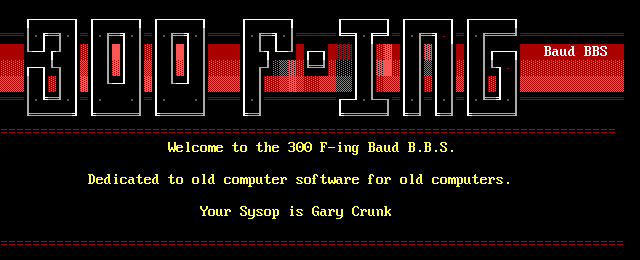

Like Bulletin Board Systems, many were built by hobbyists simply for the sake of creating, in the hope that a community of users would show up and find themselves immersed in the environment. These multi-user, real-time, text adventure games were the precursors to MMORPGs. Multi-User Dungeons (MUD) were native to this environment. Back then, Telnet for services was very popular, and the Web wasn’t necessarily widespread or even invented yet.

We suggest starting with these two searches:įinding Multi-User Dungeons (MUDs) with CensysĪs Internet adoption was taking the place of the dial-up BBS scene, access was still mostly text-based.
#Syncterm or netrunner software#
Strings which match specific BBS software banners will result in fewer results, but are more likely to be actual Telnet Bulletin Board Systems. Simply searching for the string “BBS” within Telnet banners will result in BBS hits. and/or simply because they appreciated the text-based do-it-yourself aesthetic and potential for community.to participate in inter-BBS message relay networks such as FidoNet, which still have a surprisingly active user base.for the sake of playing old BBS games, such as Legend of The Red Dragon ( there’s a fun throwback video on this) or Trade Wars.Sysops we talked to in researching this post had set up systems for the following reasons: Modern BBS-oriented terminal software such as SyncTERM and NetRunneraccurately render glyphs associated with old school computers one would have used to call Bulletin Boards and even allow the server to specify which character set to use, be it Amiga, MS-DOS or even 8-bit Atari. What usually remains, however, is the personal customization of an individual hobbyist.Īnother convenience of the modern BBS scene is that users are no longer restricted to the extended ASCII fonts supported by the user’s specific architecture for the rendering of ANSI art. That means no busy signals and no long distance charges on one hand, but also generally no locally focused community on the other, which was one of BBS’ charms. Running a BBS in 2019 is no longer constrained by geographical area, or individual phone lines. So, what does the BBS scene look like today? As powerful as the internet is, one cannot telnet all the way back to 1992.

So, while you’re having fun reliving the BBS glory days, just remember not to transmit any sensitive information. This should go without saying, but if you decide to use Telnet for this or any other type of communication, be aware that information transfer is in plaintext. However, because Censys frequently scans the internet for open Telnet ports, our data can be used as an up-to-date index of Telnet BBSes! Simply searching Telnet banners for the word “BBS” yields dozens of systems.īefore you jump in, a word of caution. They typically won’t show up in a Google search unless they have some sort of associated web presence and websites that simply list BBSes can quickly become out of date as boards come and go. Searching for Telnet BBSes in the modern age is tricky.

….Loading….skateboards, JNCOs, hacky sack, Gushers…….Hack the Planet!…….Loading… So, whether you’re itching for some old time computer nostalgia, or intrigued by an online world you never knew, take a ride with Censys down some of the less travelled roads of the Information Superhighway where BBSes still await your call – this time over Telnet. While the World Wide Web has come to dominate online communication, you may be surprised to learn that bulletin boards still exist. Typically the entire experience consisted of text-based menus and text “graphics,” customized by the operator (“SysOp”) to create a uniquely themed environment. In summary, a BBS was a system usually created by a hobbyist, accessible directly via modem phone line, providing message boards, online games, file transfer, and sometimes multi-line chat. Maybe when you need a break from the nonstop news cycle. If this all sounds completely foreign, there is an eight-part DVD documentary(“Surprisingly engrossing” – Wired) that’s worth a watch. Do you fondly recall the era where your enthusiasm regarding your Home PC’s modem was met with blank stares or possibly a comment like, “Your computer… has a phone in it?” It was a time before widespread adoption of the Internet, when communities of local Bulletin Board Systems ruled the day in all their ANSI-colored text-based glory.


 0 kommentar(er)
0 kommentar(er)
